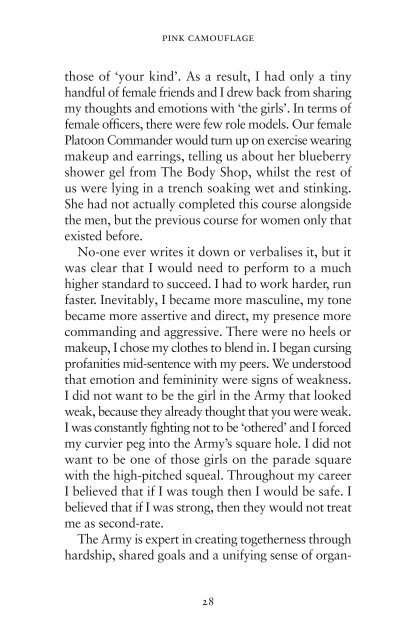Pink Camouflage by Gemma Morgan sampler
Her husband found her by the roadside, delirious and choking on her own vomit. Gemma Morgan was 33, happily married with two young children, an outstanding army service record and a first-class international sporting career. But underneath she was a wreck, surviving on a cocktail of vodka, Valium and sleeping pills. Misogyny, sexual abuse and toxic masculinity had been the daily realities of her Army career long before being deployed unarmed and unsupported to the blood and mayhem of a war zone. Motherhood left her lost and alienated, a soldier who had deliberately suppressed her femininity with no idea how to cope. Together, these experiences triggered a mental health crisis that left her suicidal, battling PTSD, betrayed and abandoned by the institution to which she had devoted seven years of her life. With the support of her family Gemma has since been on a long, hard and bumpy road to recovery. This is her story in her own words. She has told it to inspire others, especially those who have been affected by the toxic and coercive leadership culture that continues to pervade the British Army.
Her husband found her by the roadside, delirious and choking on her own vomit. Gemma Morgan was 33, happily married with two young children, an outstanding army service record and a first-class international sporting career. But underneath she was a wreck, surviving on a cocktail of vodka, Valium and sleeping pills.
Misogyny, sexual abuse and toxic masculinity had been the daily realities of her Army career long before being deployed unarmed and unsupported to the blood and mayhem of a war zone.
Motherhood left her lost and alienated, a soldier who had deliberately suppressed her femininity with no idea how to cope.
Together, these experiences triggered a mental health crisis that left her suicidal, battling PTSD, betrayed and abandoned by the institution to which she had devoted seven years of her life.
With the support of her family Gemma has since been on a long, hard and bumpy road to recovery. This is her story in her own words. She has told it to inspire others, especially those who have been affected by the toxic and coercive leadership culture that continues to pervade the British Army.
You also want an ePaper? Increase the reach of your titles
YUMPU automatically turns print PDFs into web optimized ePapers that Google loves.
<strong>Pink</strong> camouflage<br />
those of ‘your kind’. As a result, I had only a tiny<br />
handful of female friends and I drew back from sharing<br />
my thoughts and emotions with ‘the girls’. In terms of<br />
female officers, there were few role models. Our female<br />
Platoon Commander would turn up on exercise wearing<br />
makeup and earrings, telling us about her blueberry<br />
shower gel from The Body Shop, whilst the rest of<br />
us were lying in a trench soaking wet and stinking.<br />
She had not actually completed this course alongside<br />
the men, but the previous course for women only that<br />
existed before.<br />
No-one ever writes it down or verbalises it, but it<br />
was clear that I would need to perform to a much<br />
higher standard to succeed. I had to work harder, run<br />
faster. Inevitably, I became more masculine, my tone<br />
became more assertive and direct, my presence more<br />
commanding and aggressive. There were no heels or<br />
makeup, I chose my clothes to blend in. I began cursing<br />
profanities mid-sentence with my peers. We understood<br />
that emotion and femininity were signs of weakness.<br />
I did not want to be the girl in the Army that looked<br />
weak, because they already thought that you were weak.<br />
I was constantly fighting not to be ‘othered’ and I forced<br />
my curvier peg into the Army’s square hole. I did not<br />
want to be one of those girls on the parade square<br />
with the high-pitched squeal. Throughout my career<br />
I believed that if I was tough then I would be safe. I<br />
believed that if I was strong, then they would not treat<br />
me as second-rate.<br />
The Army is expert in creating togetherness through<br />
hardship, shared goals and a unifying sense of organ-<br />
28


















